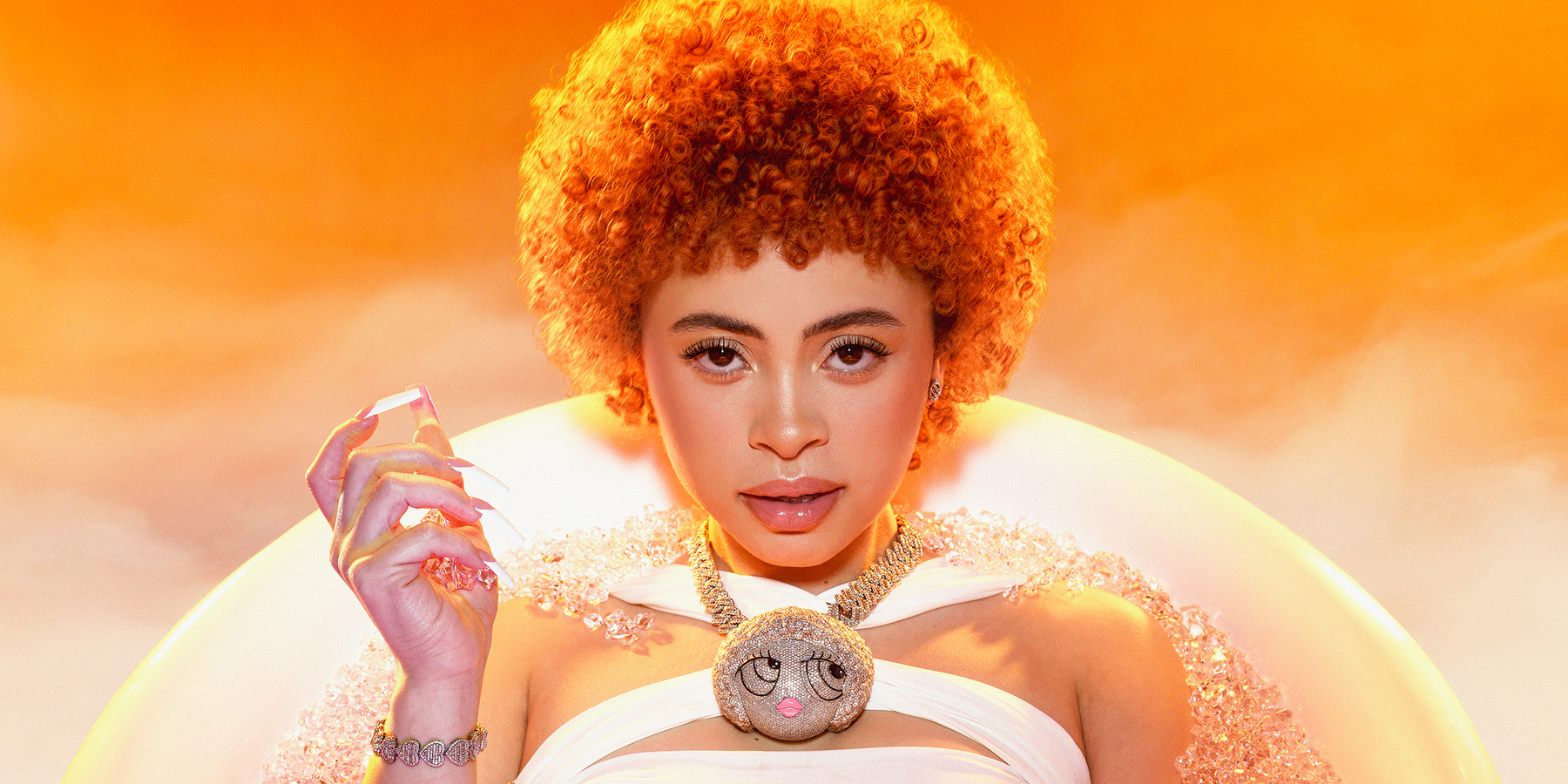
Ice Spice Heats Up
Story by Jade Gomez / Photography by Markus Klinko / Styling by Marissa Pelly / Makeup by Marla Vazquez / Hair by Davontae Washington / Set design by Wesley GoodrichApr 12, 2023

Just like it’s a rite of passage for children to be granted a key to their house, finally entrusted with the responsibility to get themselves home safely after school, New York City youth traverse the subway systems by themselves. Their bright yellow MetroCards are a key not just to the city but to independence. Maybe that’s why Ice Spice doesn’t have any complaints about being shoved into the spotlight. She’s prepared her entire life for the unexpected — even fame — whether she realized it or not.
Over Zoom, light bangs and muffled footsteps can be heard as Spice’s brother and father settle into her new apartment. They brought soul food for lunch, filling the 23-year-old rapper’s interiors with the smells and sights of her old home in the Bronx into her new one, obtained by the fruits of her labor after a grueling and intense year that saw her go from the streets to the stage in a matter of weeks.
While not much is known about Spice’s family — and she’d like to keep it that way — she does offer a glimpse into her musical upbringing by way of her father, an underground rapper in his own right who wanted to bring his daughter along for the ride.
“He definitely inspired me to want to record,” she reminisces. “I remember being in the studio with him. I was a toddler, probably. And I remember little flashes. Of course, not every detail, but small things like that being shown to you at such a young age make an impression on you. Subconsciously, I ended up becoming an artist because I saw my father be one first. He's a music lover himself. He's a true hip-hop head, beyond me, honestly. He knows everything. He's always educating me on hip-hop and shit like that.”
While taking in a steady diet of Top 40 songs, neo-soul, old-school hip-hop and doses of EDM, Spice’s musical world began to take shape around her, not knowing how much it would follow her into adulthood. She also attracted attention throughout her childhood and teenage years for her hushed deep voice, which would soon become her signature.
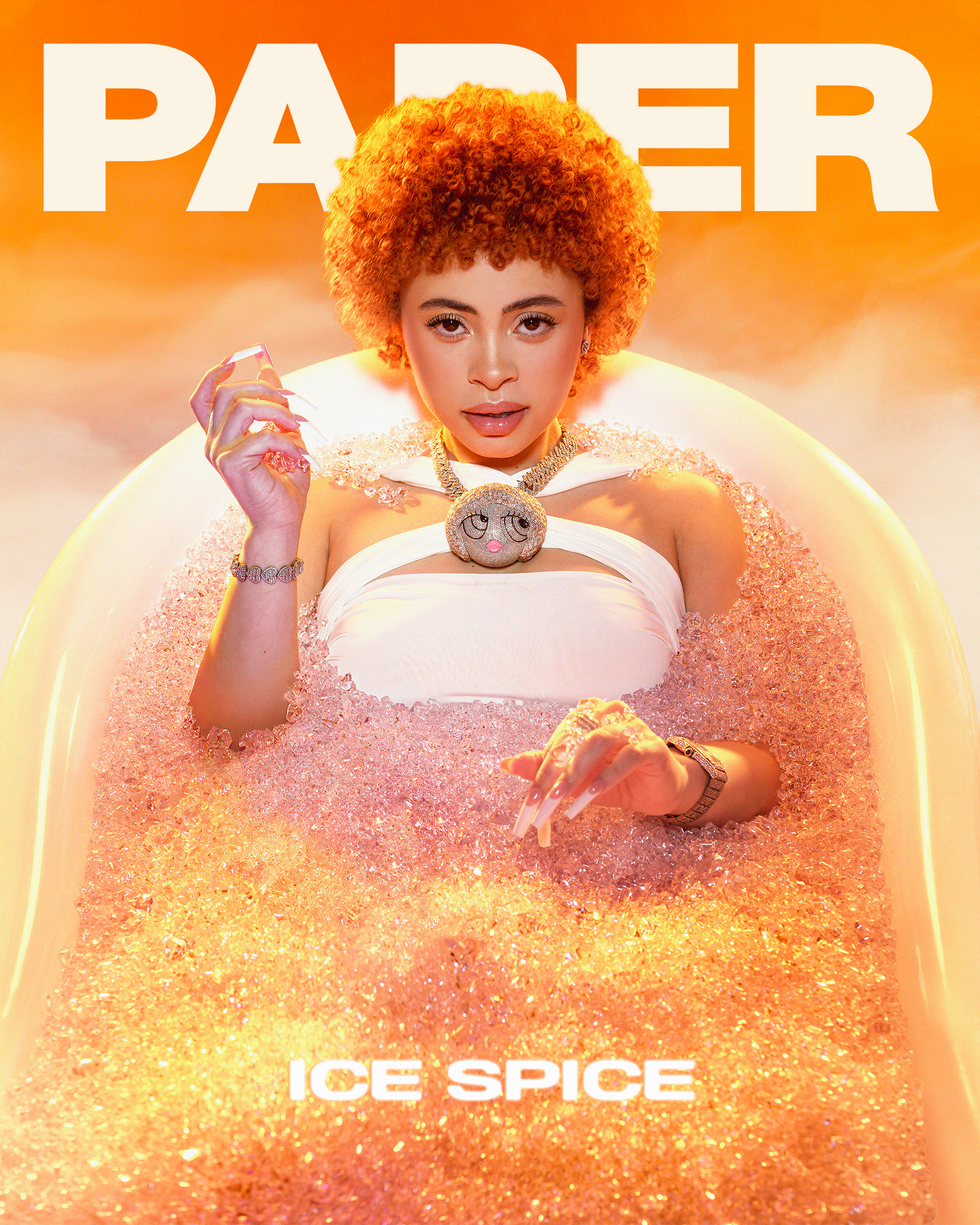
Top: The Attico, Earrings: MARLI New York, Chain, bracelet, watch and ring: Artist's own
“Growing up, I remember having a deeper voice than a lot of girls, and boys would try to make fun of me,” Spice recalls. “I remember being in school and people imitating me, trying to talk like me, or saying shit that I would say and thinking it's so funny. It was years of just hearing that and accepting it and then thinking it's funny too, and then eventually using it to my advantage. I'm just happy I get to have a career based off how I sound and things I say.”
Like many emcees, Spice got her start writing poems, eventually pursuing her music career seriously after meeting now-frequent collaborator RIOTUSA while the two were enrolled at SUNY Purchase. She eventually dropped out, keeping a close relationship with the producer as the pair struck gold. Early singles such as “Name of Love” and “No Clarity,” both of which sample pop EDM bangers by Martin Garrix and Zedd respectively, tapped into the nostalgia of the early 2010s that the pair’s generation holds closer to the heart than they do late ’90s and early ’00s club hits and ringtone rap songs.
There’s an underlying diaristic quality to all of Spice’s songs. Her rapping voice settles comfortably in her deep, breathy register that commands attention and shines in sincerity. Skittish snares and kicks add texture to the Bronx rapper’s unwavering confidence. There’s no need to look past the lyrical simplicity (such as the sobering “I know I'm not trippin', I know I'm not buggin'/ I try to talk, but you switching the subject” on “No Clarity”), because Spice leaves nothing to abstraction. Chronicling the near-universal experiences of dating, trifling and existing through the lens of her womanhood, her music feels just as therapeutic for her as it is a means of creativity, like the equivalent of posting a teary-eyed selfie on your Instagram Story.
While that all seems like standard fare for most music today, Spice’s position within drill music makes her an anomaly. The genre took root in Chicago in the early 2010s, helmed by the likes of Chief Keef, Lil Durk and Fredo Santana. Their nihilistic accounts of crime and everyday life in the city became a worldwide phenomenon, spreading to New York and birthing one of the city’s first drill stars, Bobby Shmurda, with his 2014 single “Hot N***a.” The genre also made its way overseas, serving as a blank canvas for UK rappers to provide their unique perspective on violence, replacing firearms with knives and telling hedonistic tales. As opposed to Chicago’s darker, moodier production, UK drill took influence from grime and garage, telling fast-paced stories with frenetic production laced with hi-hats and dancier rhythms also seen in Latin music.
With UK drill coming back to the States to influence New York’s reinvigorated scene, hip-hop history repeated itself and the youth found an accessible musical outlet that gave birth to dances, party anthems and young stars such as Kay Flock, Cash Cobain and the late Pop Smoke. Spice was in the middle of it all, playing into the more whimsical side of the city’s burgeoning scene. Echoing the gruff sensuality of Lil' Kim and Pop Smoke alike while armed with the wistful vulnerability of Taylor Swift (who she has gone on record to say she’s a fan of), Spice doesn’t exactly fit into drill’s initial framework, and that’s a recipe for mainstream success.
“I don't know if I fit in. I think that's what makes me so different,” Spice acknowledges. “I feel like it's a new lane that I've started, and I'm starting to hear a lot of other artists sound like they belong in my lane now.”

Catsuit: AREA, Corset and boots: Balmain, Chain and rings: Chrome Hearts
By August of 2022, the stars aligned for the release of her latest single, “Munch (Feelin’ U).” There wasn’t a sample or a feature, just Riot’s room-shaking production and Spice’s snarky dominatrix-like dismissal of an obsessed lover. A warbled “whomp” shakes Spice into view as her innate talent for delivering a good hook wrapped in her devilish cool commanded millions to shake ass, dance, cringe, smile or watch along slack-jawed at the birth of rap’s newest phenomenon.
Whisked away by the current that “Munch” took her on, the pieces came together quickly. The single began to climb on the charts, eventually hitting No. 5 on Billboard’s Bubbling Under Hot 100 and No. 35 on Billboard’s Hot R&B/Hip-Hop Songs. Drake gave his immediate cosign. “Munch,” a term that refers to a desperate man, swiftly entered everyday vocabulary. Critics across major outlets marveled at this sudden newcomer, while Spice could proudly boast being one of the few viral stars that didn’t have “industry plant” allegations levied against her. At just under two minutes, “Munch” became inescapable.
New York City, as densely populated as it is, still felt like neutral ground for the rapper in the wake of the shit-talking hit. Then the effects of stardom began to creep in.
“I remember I went to SoHo to shop, and I was just on foot walking around—“
“You weren’t with anyone?” I interject.
“No, I was by myself,” she replies with a giggle. Her voice rounds out and becomes more serious. “I was walking towards the car or some shit like that, and somebody was trying to take a picture of me! I'm just mad confused why he's trying to take a picture of me. Then I had realized it’s because ‘Munch’ is out.”
Her tone lightens as she remembers one of her favorite anecdotes to counter that experience:
“I remember I was in the mall and this little group of kids swarmed around me like, ‘Are you the “Munch” girl? Oh my God.’ And that was the first week ‘Munch’ had came out. So real shortly after that, that's when I started to realize my fame was picking up and people was constantly coming up to me. I started to know gradually. It's not like one day, you're like, ‘Oh yeah, I'm famous.’ At some point, any time you step out the car, instantly people know you, instantly screaming your name.”
Spice has attempted a number of disguises to alleviate the stress of being accosted on the streets, but it’s still difficult to pin down. “I'll just be hiding in a disguise a little bit, but people started to pick up on them,” she explains. “People tell me it's my eyes.”
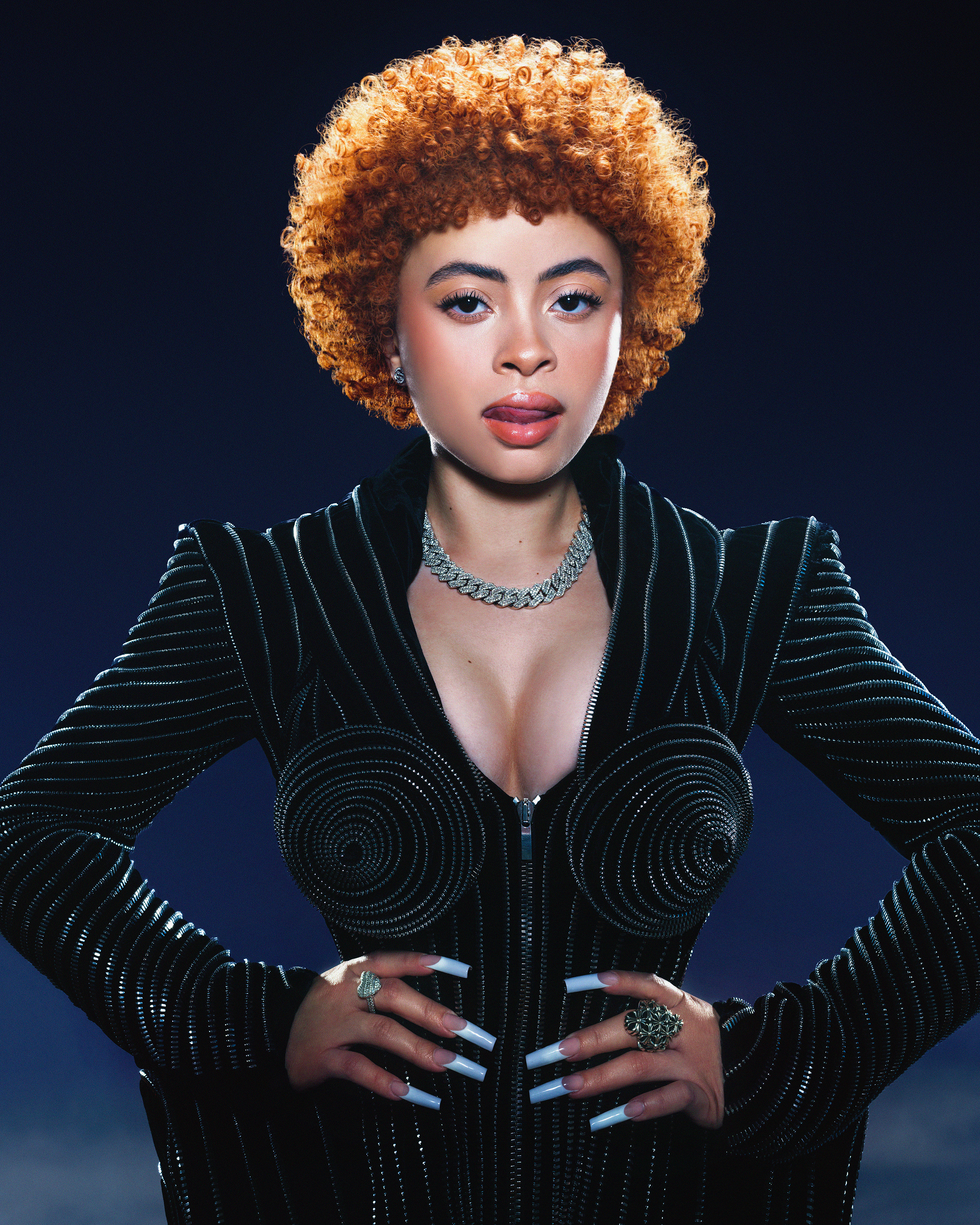
Dress: Jean Paul Gaultier, Right ring: Chrome Hearts, Earrings: Le Vian
With only a few shows under her belt as the hype grew, Spice also had to prioritize her wellbeing and protection. “I started to not want to really perform at clubs as much because it started to feel a little scary performing in a club versus performing on a stage,” Spice explains. When I reassure her that the claustrophobia of clubs can compromise her safety, she sighs. “I'm not saying I'll never do them again, but I'll do it when it makes sense.”
While the occasional nightclub appearance is nothing to scoff at, the doe-eyed rapper didn’t have to worry for too long about being relegated to their sweaty interiors. Only a few months after being put on the bill for her first-ever paid show put on by SoundCloud, Fivio Foreign brought her out during his Rolling Loud set. The festival behemoth has become a rite of passage for the new crop of hip-hop hopefuls, platforming overnight stars, streaming service darlings and industry vets.
But when Spice took the stage, not all reception was warm. It was a big deal to be face-to-face with thousands of people from her city, and her excitement and nervousness were apparent. She was weeks into a viral hit, struck with the intense vitriol of an internet unsure of where they stood with her. Spice was acutely aware of how the public hazes overnight superstars. She just had to wait it out.
“A lot of people switched up on the song,” Ice Spice said in an early-career interview with Rolling Stone. “At first they were like, ‘This is trash, whatever.’ And then the next day they’re like, ‘I can’t stop thinking about it.’”
Perhaps best described as the epitome of “they hate to see a bad bitch winning” memes, the lethal combination of beauty, talent and palpable indifference made her an easy target. But when asked why she thinks this may be, whether humility or genuine lack of awareness, Spice can’t explain it.
“Truthfully, I don't know. I'm me,” she says. “I think it's just a combination of things that makes me who I am, honestly. I can't really pick myself apart trying to figure out why people are interested in me. I just like to focus on having fun and being myself and thinking about what I want to do and not really what other people want me to do.”
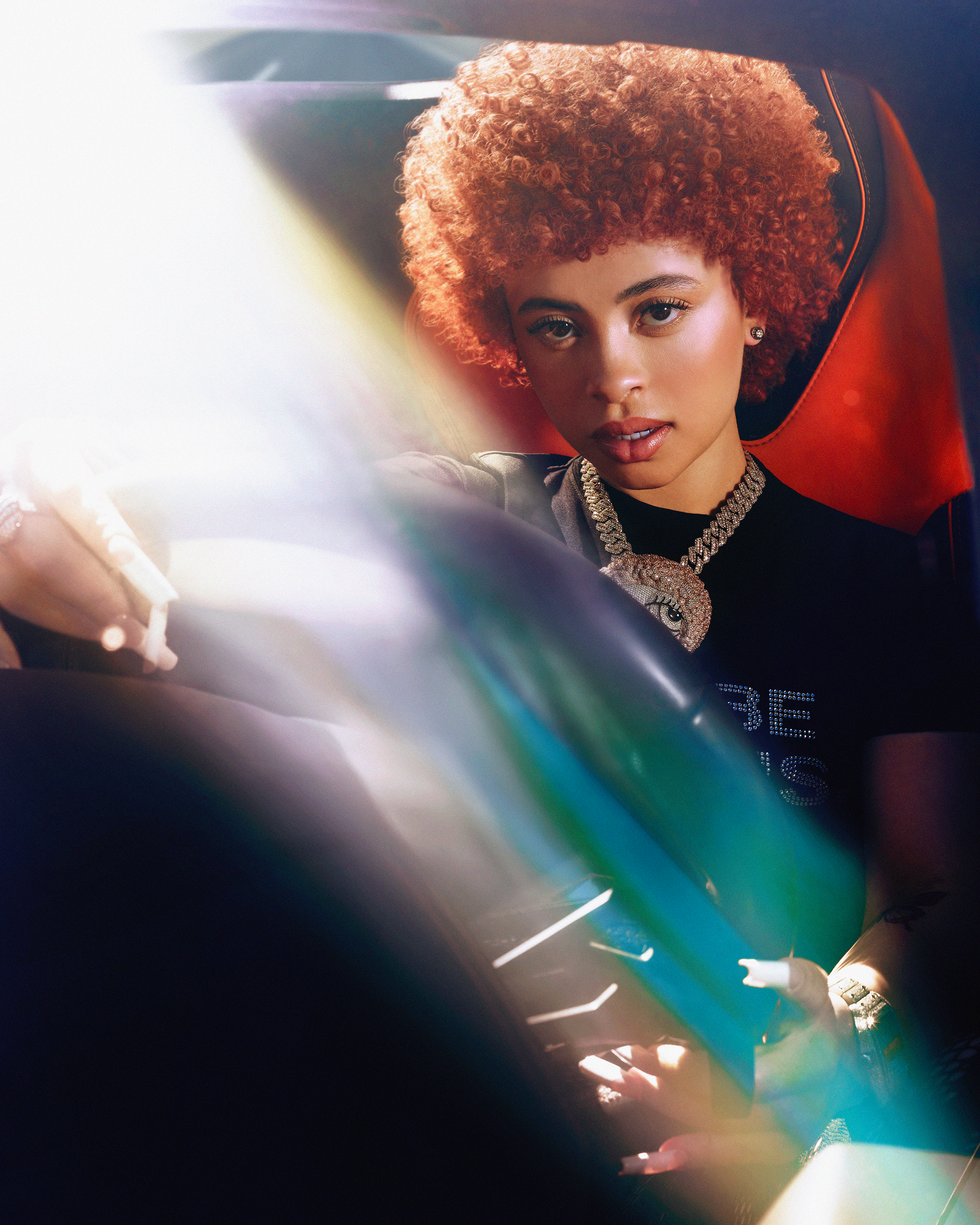
Shirt: Vetements, Earrings: Le Vian
Spice doesn’t allow herself to linger on self-critiques for too long out of annoyance that other people will use that as permission to do the same. “I would say I am a critic of myself, but the second other people start to critique me, I instantly become my biggest supporter and I'm like, ‘Whoa, whoa, whoa, not too much.’”
There is an alarming — yet refreshing — lack of urgency in everything Spice says. After completing a “Munch” run to capitalize off the song’s rising popularity, she became tired of only having so much to offer from such a small catalog. “I feel like people are always thinking like, ’Okay, what's next,’ after a certain time,” she explains. “About a month in, I was just starting to feel like they want new music."
The tides began to turn with the release of her second hit “Bikini Bottom.” After the snippet went viral due to its instrumental being reminiscent of the frantic strings that play whenever there’s an emergency in SpongeBob SquarePants, Spice leaned into the joke. She even added an extra layer to it, revealing in a resurfaced clip that she used to have a “crush” on the giggly cartoon icon.
What one might call savvy she would just call second nature. In any case, the hip-hop transgressor’s perfectly calculated rollout was the key to her success. Instead of succumbing to the destructive pressure of a viral hit with a bloated debut full of trendy features, Spice unleashed in January the six-track EP Like..? with only one feature helmed by none other than fellow hometown hero Lil Tjay.
It's a simple and sufficient mic drop in the face of detractors, each song giving glimpses into the seemingly never-ending potential of Spice’s stardom. Rumbly bass buries electronic twangs that creep into focus like a horror movie villain as she embodies the soft, calculated and menacing swagger of her male counterparts on “Princess Diana,” a stark contrast to the airy “Actin’ A Smoochie.” Spice’s breathy delivery is punctuated with grrahs, her more muted impression of gunfire, interspersed within bars about being dismissive to men ("And I just fell in love wit' a gangsta/ So he put my name in a tatt'/ But I don't let him come to the crib/ So we get it on where we at") and snarling antagonism ("Bitches won't bark, but they wanna bite/ I got two milli' for usin' a mic, bitch").
The young rapper doesn’t spit in haters’ faces so much as she gives them a sly wink. From her Keely Majewski-illustrated album cover, which features a cherub-like version of Spice peeking between her legs with her acrylic nails playfully caging her crotch — her now-signature pose — to the song title “Princess Diana,” a possible nod to being seen as the “The People’s Princess” in her own right, it’s hard for anyone to deny the subtle punk transgression that the Bronx native readily embodies with disarming humility and calm.
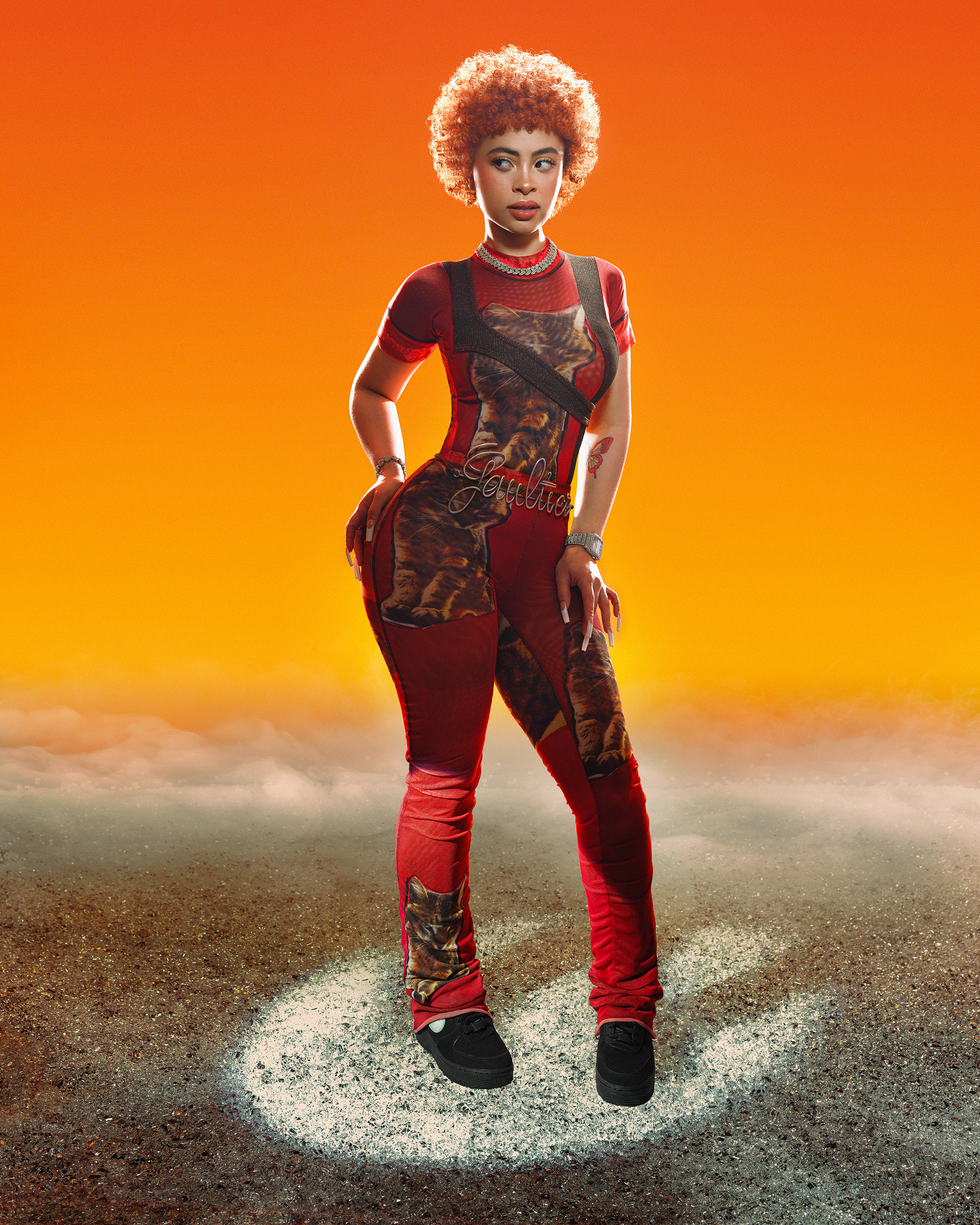
Top and pants: Ottolinger, Belt: Redefined Vintage, Sneakers: Nike x Tiffany & Co
When pressed on the inner machinations of her mind, figuring out which levers and buttons correspond with fear and risk, she coolly explains, “I feel like every single thing is a risk. Almost everything, honestly.”
As the eldest of five children living as a young woman in the Bronx, one can’t help but attribute some of her attitude as not just indicative of the fierce protector of her siblings but also of the city as a whole. From a young age, the city teaches you the extremes of human cruelty and kindness. Don’t linger on eye contact too long, avoid looking lost and confused, keep walking when someone pesters you and learn how to protect yourself.
At the same time, Spice possesses the street-smart charm that defines New York despite its harsh portrayals in the media. Citizens will guide you on the train and remind you of your stop, welcome you with open arms into the warm lights of the bodega after a hard night out and crack a smile when the subway performers pass the bucket around. In video interviews, performances and even over Zoom, Spice chooses her words carefully. She’s unafraid to ask what a question means and speaks with a conversational cadence.
Although Spice doesn’t want to be seen as an anomaly, constantly emphasizing, “I’m just me,” throughout our conversation, the competitive nature of hip-hop and the misogynistic desire to pit her fellow rappers against her attempts to plague her meteoric rise. She simply shakes it off, happy to be at the forefront of rap’s female renaissance as an endorsement becomes only a minuscule part of a larger narrative.
“I think it's important to be yourself first before you try to be anybody else, at least for me,” she says of refusing to lean too heavily on cosigns and superstar friendships. “I think it's important that people have their own motion instead of trying to rely on somebody else's motion.”
While Spice and the growing number of chart-topping women in hip-hop are still being seen as the answer to a hyper-masculine genre, she does not see herself in competition with these men, either. “New York raised me,” she matter-of-factly explains. “I've been knew this, been around men, had to pass men in the streets, had to take the train with men. So coming into the industry, it's not just like, ‘Whoa, there's men here?’ It's like, ‘Okay, that's the world.’”
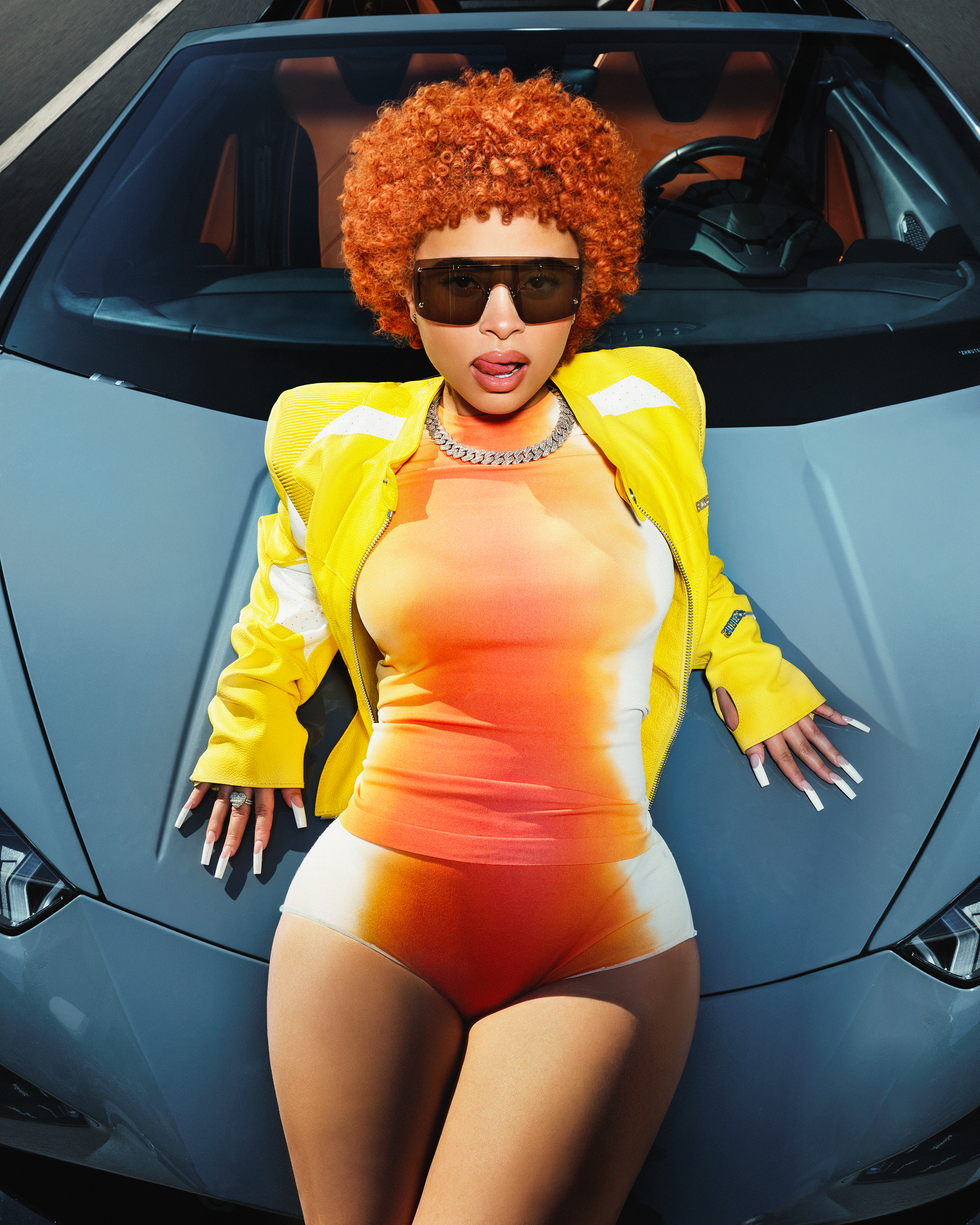
Top and panties: Ferragamo, Jacket: GCDS, Sunglasses: Alexander McQueen
In a behind-the-scenes video from “Munch,” the serendipitous moment of her being lifted up onto a basketball hoop captures the kinship and protection she has with the men around her, with one voice warmly warning her, “Be careful with your nails.” That love is an extension of the basic tenets of city life as well as the deep-seated loyalty and love she has for her borough, which is reciprocated tenfold.
The conversation circles back to an earlier remark when she called herself “famous,” a dirty word so many people shy away from. She’s not afraid to admit it, stating it as a fact more than a boast. While she is well-protected and respected by her city, she’s also aware that she has to move differently now as the recently crowned “Rap Princess.” She’s even moved to neighboring New Jersey, which she says is “where everybody moves when they get a little bit of bread.”
Through it all, Spice just wants to have fun. She looks forward to traveling across the world for upcoming festival appearances, now armed with a larger repertoire of songs to share. She relishes the special moments like running into some of her biggest fans and idols alike. Once it's done, she can come home to a city that loves her and a family that supports her.
At its core, music is a creative outlet, a reflex and an instinctual obligation for Spice. It’s a way to connect with her home and her innermost feelings. While not all music needs to save the world, that doesn’t mean it isn’t vital. Locked in her bedroom, the biggest rap star in the world agrees with an emphatic “yes.”
“It’s survival.”
Photography: Markus Klinko
Styling: Marissa Pelly
Makeup: Marla Vazquez (using Pat McGrath Labs)
Hair: Davontae Washington
Set Design: Wesley Goodrich
PA: Diego Lopez De Anda
Editor-in-chief: Justin Moran
Editorial producer: Alyson Cox